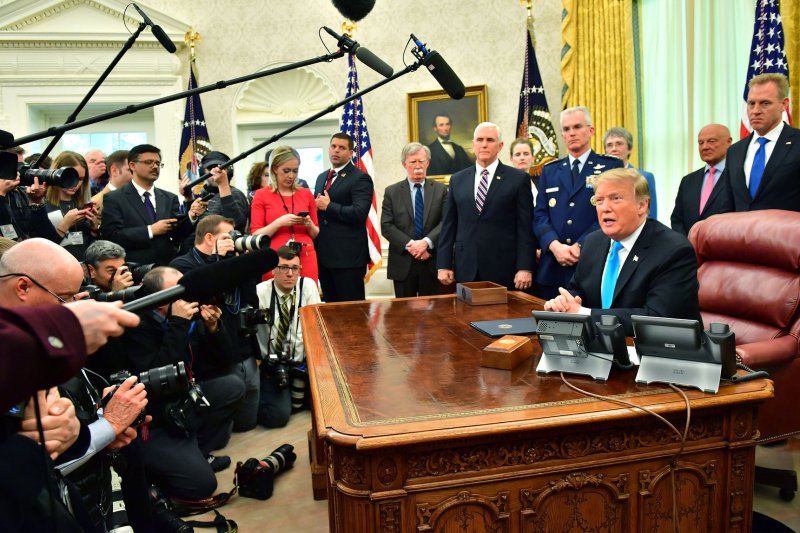President Donald J. Trump signed a directive to establish a Space Force on February 19, 2019. File Photo by Kevin Dietsch/UPI |
License Photo
June 10 (UPI) -- A draft of the National Defense Authorization Act released by the House on Monday has no mention of the Space Force envisioned by President Donald Trump.
The House Armed Services Committee will debate the matter on Wednesday, members of the committee said.
Rep. Adam Smith, D-Wash., committee chairman, said any inclusion of funding would build an outer space military branch "smaller and more focused" than Trump's plan, which calls for a Space Command as a division of the U.S. Air Force before it can be spun off into a separate branch with the same status as the Army, Navy, Air Force and Marine Corps.
Trump unveiled his plan in February, saying "Space, that's the next step and we have to be prepared. I think we'll have great support from Congress."
"The main difference is less bureaucracy," Smith said, noting that the House would insist on fewer mandatory transfers of personnel and lower overall costs. He added that a military space force has been considered in the past, and that passage of a bill need not be regarded as a win for Trump.
"This is not President Trump's idea. Of the many bad ideas this president has had, don't think of this as: 'If you're for the Space Force, that means you 100 percent support President Trump,'" Smith said. "We were talking about this long before the president knew Space Force even existed. He grabbed onto it, but it isn't about him."
Smith admitted, though, that the Air Force has not prioritized military use of space while China and Russa have made it a priority.
"I think the Air Force has not done a particularly good job of managing space," Smith said on Monday, "and if I was not in a breakfast setting with a bunch of reporters I would put that much less diplomatically. They're not doing a good job."
A Senate version of the bill includes $72.4 million for formation of the new service branch, but unlike the White House proposal, does not authorize an undersecretary of the Air Force for space matters. A similar proposal passed the House in 2017.
The Senate and House must reconcile their versions of the bill before final passage, and debate will offer Space Force proponents in Congress additional opportunities to promote their visions.















